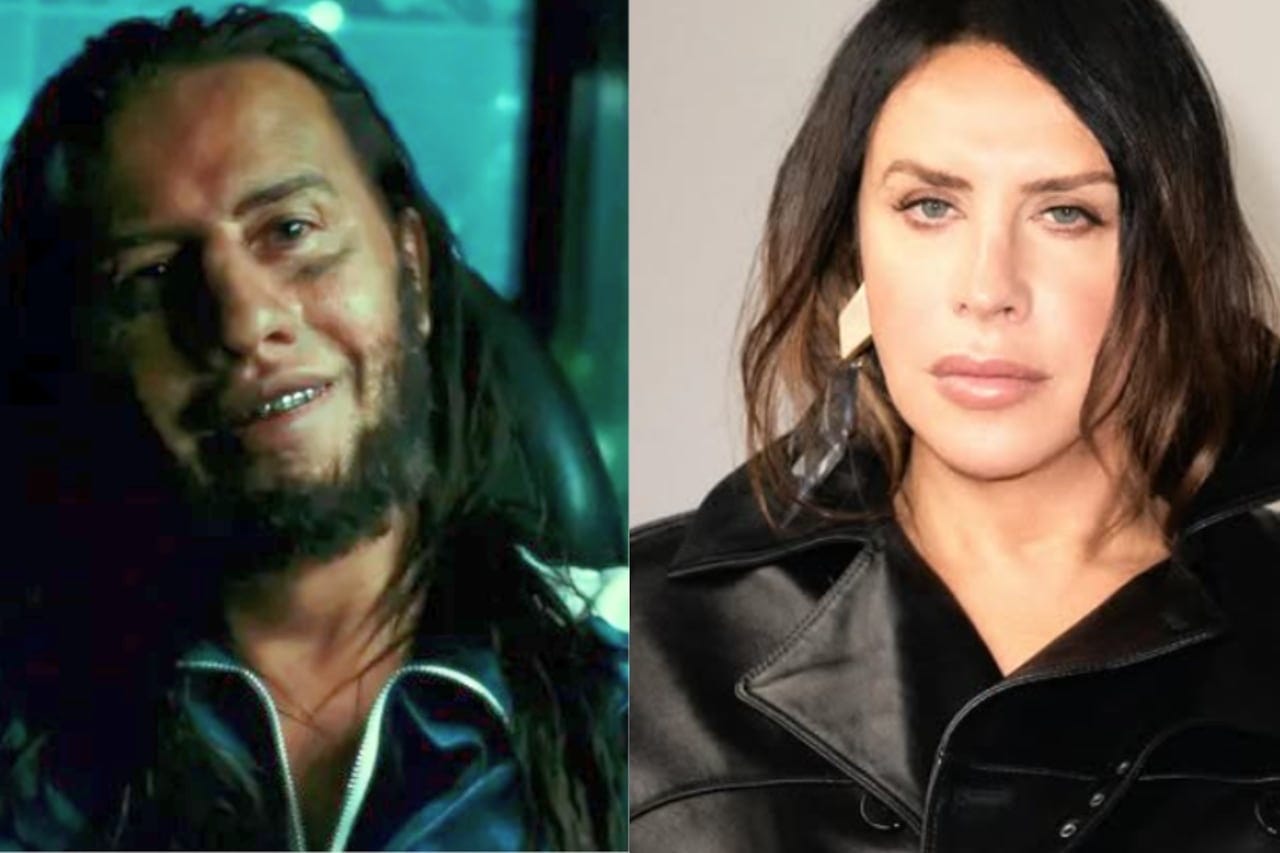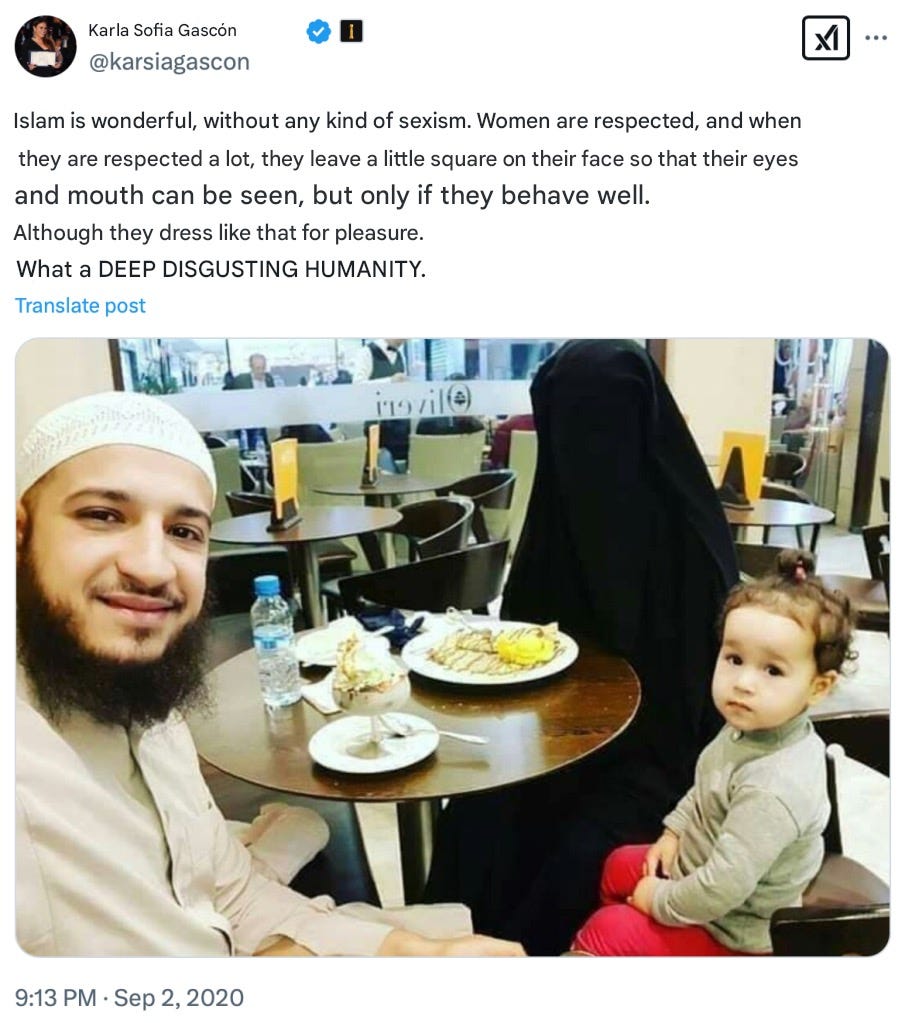In a time of great division, Emilia Pérez is the great unifier. Everyone hates this movie: conservatives, feminists, liberals, Mexicans, musical fans, trannies. The only people who seem to like it are the critics paid to write favorable reviews on Rotten Tomatoes and the Academy, who nominated it for a whopping 13 awards. (For reference, The Godfather was only nominated for 11.) One of these 13 awards just so happens to be Best Actress, and that “best actress” just so happens to be a man.
Karla Sofia Gascón, born Juan Carlos Gascón, has made herstory as the first openly “transgender” actor to be nominated for the category. (I love when they specify “openly”, as if no one would know.) Of course in reality, he's the first man to be nominated for best actress, proving once again that transgenderism seeks, and often succeeds, to destroy any meaningful difference between men and women while simultaneously blotting out women from public life by claiming that men are the real women, actually.
Because everyone hates this movie right now, there’s no shortage of hit pieces about it, on this platform and beyond. I wanted to add one more to the pile, however, because my husband and I noticed something that I haven’t seen anyone else mention yet: the ironic parallels between Emilia’s life and Gascón’s since coming under fire for resurfaced tweets.
If you somehow haven’t seen the infamous sex change clip yet or aren’t aware of the plot, I’ll briefly summarize it here. Emilia Pérez centers around a drug cartel boss, Juan "Manitas" Del Monte, who wants to leave his life of crime behind and “become a woman”. (There’s something very Shakespearean about a man pretending to be a woman pretending to be a man.) To do this, he seeks the counsel of a lawyer (Zoe Saldaña), to help him procure transgender operations in Bangkok and Tel Aviv, then transfer his wife Jessi (Selena Gomez) and children across the world to live in Switzerland so he can embark on his new life.
After Zoe’s “mission” is complete, the two part ways. Four years later, they meet again in London where Manitas, now going by Emilia Pérez after faking his death, decides it’s finally safe enough to return to Mexico and reunite with his wife and children. Once in Mexico, Emilia is confronted with the reality of his past as a drug lord. He’s suddenly forced to reckon with the incredible body count he racked up and the emotional and psychological toll left on the victims’ families.
At first, Emilia tries to distance himself from his former ways, claiming he “doesn’t know Manitas anymore” and that he’s moved on. But then, being a sensitive and empathetic woman now, he has a change of heart and decides to right all the wrongs of his past by starting a charity that allows criminals and former gang members to confess who they killed and where they hid the bodies so that grieving families can properly mourn and bury their loved ones. Touching stuff.
Meanwhile, Jessi somehow doesn’t recognize Emilia and believes he’s actually Manitas’s cousin. In this way, Jessi becomes a sort of unwitting trans widow, her life having been upended by Emilia/Manitas’s selfish choices and decision to put his sexual fetish above all else, though she isn’t aware of it. Her experience closely mirrors that of so many real-life trans widows, though the film isn’t interesting or nuanced enough to explore what this means in depth.
Jessi soon reconnects with former flame Gustavo, another cartel member whom she cheated on Manitas with prior to his transition. When Jessi announces her engagement to Gustavo, Emilia becomes enraged and assaults her, throwing her on the bed and forbidding her from taking his children away…the same ones he willfully abandoned for four years. Jessi escapes with Gustavo and the children and kidnaps Emilia for ransom before the three of them end up dying in a fiery car crash. The final scene depicts the townspeople parading around a statue of Emilia that looks suspiciously like the Virgin Mary. The end.
In real life, Gascón seems to have a hidden past of his own. Much like his character, Gascón didn’t always identify as a woman. He lived as a man for most of his life, and he tweeted like one too. Recently resurfaced posts reveal Gascón tweeting unfavorably about mass muslim migration in Europe, diversity at the Oscars, and — horror of horrors — George Floyd!
The post about George Floyd reads:
“I really think that very few people ever cared about George Floyd, a drug addict swindler, but his death has served to once again demonstrate that there are people who still consider black people to be monkeys Without rights and consider policemen to be assassins. They’re all wrong.”
And, ironically, from 2021:
“More and more the #Oscars are looking like a ceremony for independent and protest films, I didn’t know if I was watching an Afro-Korean festival, a Black Lives Matter demonstration or the 8M. Apart from that, an ugly, ugly gala.”
In the aftermath of these tweets, director Jacques Audiard, Zoe Saldaña, and co-star Selena Gomez have all come out publicly against Gascón. In an interview with Deadline, Audiard laments how the exhumed social media posts have sucked up all the air around the film, making him “very sad”.
“[W]hen you have that kind of relationship and suddenly you read something that that person has said, things that are absolutely hateful and worthy of being hated, of course that relationship is affected. It’s as if you fall into a hole. Because what Karla Sofia said is inexcusable.”
In a podcast episode for Variety, Saldaña said she was “very disappointed” in her co-star, adding that the filmmakers were “all about inclusivity and collaboration and equality of all sorts”.
The situation presents obvious parallels to Gascón’s character. After living out a despicable and shameless life of crime, Emilia gets a sex change operation, starts a charitable organization, and all is forgiven. Off-screen, Juan Carlos committed online wrong-think then “transitioned” into a woman, hoping to leave the sins of his former life behind. In real life, however, all is not forgiven. His colleagues and co-stars have all denounced him, his own fans find his behavior indefensible, and even trans activists want nothing to do with him or his movie. (Though admittedly, that was true before the tweets.) Running a drug cartel, kidnapping, murder, and the dismemberment of bodies is all fine and good, just make sure you don’t tweet anything off color about Muslims or George Floyd!
But is it really because Gascón committed the cardinal sin of leftism — racist tweets — or because no amount of cross-dressing or transgender operations in Bangkok will ever change who you really are inside? As the movie tells us, “changing the body changes society”. Clearly, that isn’t true in Gascón’s case, or anyone else’s. In fact, “transitioning” for men doesn’t change them into sympathetic, vulnerable women. Far from it. For most, it means giving in to their most base impulses, a way to embrace their darkest sexual urges and use them as both shield and sword, a means to deflect criticism, crybully, and in the worst cases, commit violence.
To many on the left, there is no forgiveness for the kinds of crimes Gascòn is accused. There is no coming back from blaspheming the name of a secular saint like George Floyd. Once a racist, always a racist, the thinking seems to go. Will they ever apply the same logic to transgenderism and realize that a man will always be a man? Will trans-identified men and the crimes they commit ever be held to the same level of scrutiny as wrong-speak on Twitter?
It may seem absurd that the characters in the film are so willing to forgive Emilia for his past as a drug lord. Yet looking again to real life, many trans activists and allies often leap to defend much worse. To find an example, one must look no further than the recent case of Jaia Cruise, a trans-identified man charged with the fatal stabbing of U.S. postal worker Ray Hodge. As reported by Genevieve Gluck, activist organization The New York City Anti-Violence Project was quick to defend Cruise in the aftermath of the attack, claiming that as a “trans woman of color” Cruz is the real victim, having suffered misgendering, mocking, and dehumanization in “a flagrant display of cis-supremacy, misogynoir, and transmisogyny.”
It’s no secret that politically motivated internet sleuths are quite fond of digging up old tweets to bring someone down at the height of their fame. And much like the bodies dug up from Emilia Peréz’s criminal past, it seems no one is spared from this tactic — not even musical trannies. The victim hierarchy is a delicate thing. Holding just one victim point, trans, is not enough to protect you from the myriad of other -isms and -phobias, Islamophobia and racism not least of them. In fact, I’d argue that anything having to do with race still remains at the very top of the victim totem pole. Trans, I’m happy to report, is finally starting to lose its grip.
I’ll leave you with the words of Gascón himself, seemingly admitting that his identity wasn’t enough to save him from an ideology eternally doomed to turn on its own.
“I want to acknowledge the conversation around my past social media posts that have caused hurt. As someone in a marginalized community, I know this suffering all too well, and I am deeply sorry to those I have caused pain. All my life, I have fought for a better world. I believe light will always triumph over darkness."








The timing of these tweets and the media coverage are pretty convenient. It's pretty interesting and noteworthy these didn't come out before the Golden Globes or Cannes, where the movie won and he spoke, making a fool of himself.
I think that the people behind the scenes knew that if they didn't take some action, he would win the Oscar because voters just go along with the trends and voters might view it as a response to Trump. So, accusations of racism would work best so they can maintain the moral high ground.
The Oscar brings a level of world attention that will lead to disgust from normal people, but some of the smarter studio execs/publicists/the director knew that the backlash would be egregious and used as an example of how stupid and woke Hollywood is (and it is).
So they're sabotaging the campaign to avoid all that so he does not win. I have no proof of this, so I am just thinking what makes the most sense here.
I hope Demi Moore wins though.
Re: Surgery not turning men into sympathetic, vulnerable women. Yes:
"A Swedish study found that post-operative males who identify as transgender had criminal-conviction rates that were comparable to male controls. In other words, sex reassignment did not decrease men’s risk for criminal convictions. Males who identify as transgender are not dangerous to females because of their gender identity; they are dangerous because they are male.
"The study also compared conviction rates of post-op trans-identified males to those of women to test whether trans-identified males successfully became similar to women in that way. They did not. Their rates of conviction, like men’s overall rates of conviction, remained significantly higher than women’s."
Source: Women's Sports Policy Working Group: https://womenssportspolicy.org/the-resolution/#_ednref45
Research: https://murrayblackburnmackenzie.org/2021/04/21/long-term-follow-up-of-transsexual-persons-undergoing-sex-reassignment-surgery-cohort-study-in-sweden-a-review-of-dhejne-et-als-findings-on-criminal-convictions/